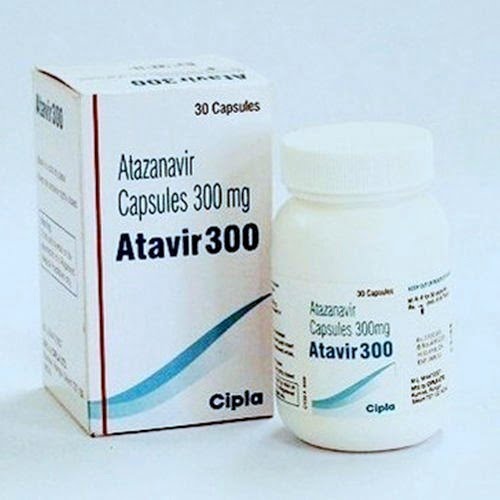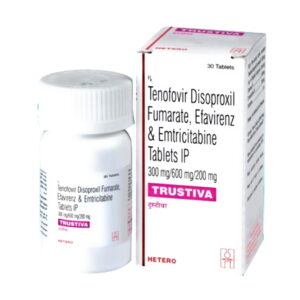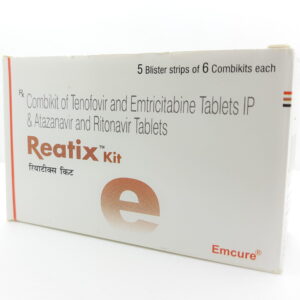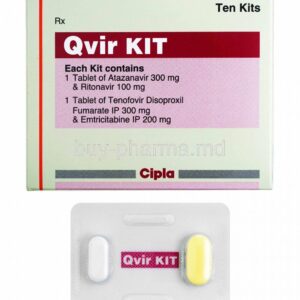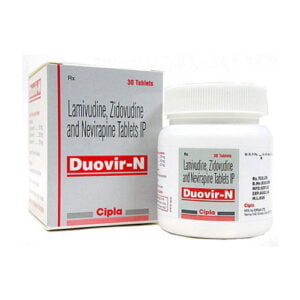Last Updated on July 18, 2024 by admin
Introduction to Atavir 300mg Capsule
Atavir 300 Capsule is a cornerstone in the treatment of HIV infection, classified under the antiretroviral medication category known as protease inhibitors. These medications play a crucial role in managing HIV by inhibiting the protease enzyme, which is essential for the virus’s replication within the human body. This mechanism helps in reducing the viral load, thereby improving the patient’s immune function and slowing the progression of HIV to AIDS.
The introduction of Atavir 300 Capsule has marked a significant advancement in modern healthcare. These tablets are typically prescribed as part of a combination antiretroviral therapy (cART), which involves the use of multiple antiretroviral drugs to achieve maximum suppression of the HIV virus. The efficacy of Atavir 300 Capsule in reducing viral load and its relatively favorable side effect profile contribute to its importance in current HIV treatment protocols.
Atavir 300 Capsule are designed for oral administration, making them convenient for patients. The recommended dosage and administration schedule are determined based on individual patient factors, including the presence of other medical conditions and concurrent medications. Healthcare professionals emphasize the importance of adherence to the prescribed regimen to ensure optimal therapeutic outcomes and minimize the risk of drug resistance.
For those seeking more detailed information about Atavir 300 Capsule, reputable sources such as the U.S. National Library of Medicine’s MedlinePlus and the World Health Organization provide comprehensive insights into the drug’s pharmacology, clinical trials, and patient guidelines. Additionally, drug databases like Drugs.com and RxList offer user-friendly interfaces for accessing data on dosage, side effects, and patient experiences.
Understanding the role and benefits of Atavir 300 Capsule within the broader context of HIV treatment underscores the importance of continued research and patient education. This ensures that individuals receiving Atavir 300 Capsule can achieve better health outcomes and maintain a higher quality of life.
Uses of Atavir 300mg Capsule
Atavir 300 Capsule , primarily prescribed for the management of HIV infection, play a crucial role in antiretroviral therapy (ART). These tablets belong to the class of medications known as protease inhibitors, which work by inhibiting the action of the HIV protease enzyme. This inhibition is vital as it prevents the virus from replicating, thereby reducing the overall viral load in the patient’s bloodstream. Lower viral loads are associated with improved immune function and a decreased risk of HIV-related complications.
Clinical guidelines from esteemed organizations such as the World Health Organization (WHO) and the Centers for Disease Control and Prevention (CDC) recommend Atavir 300 Capsule as part of combination therapy for individuals diagnosed with HIV. The combination therapy approach, often referred to as Highly Active Antiretroviral Therapy (HAART), has been shown to be more effective in managing HIV than monotherapy, as it targets the virus at multiple stages of its lifecycle.
Beyond its primary indication, Atavir 300 Capsule have been explored for off-label uses supported by emerging medical evidence. Some studies suggest potential benefits in treating other viral infections, though these uses are not yet approved by regulatory authorities. For instance, research has indicated that Atavir 300 Capsule might have activity against certain strains of the hepatitis C virus, though further investigation is required to substantiate these findings.
It is also noteworthy that Atavir 300 Capsule has been evaluated for its effects on reducing inflammation and immune activation in people living with HIV. These properties can contribute to better overall health outcomes, as chronic inflammation and immune activation are common issues in HIV patients that can lead to comorbidities.
In summary, Atavir 300 Capsule are a cornerstone in the treatment of HIV, significantly contributing to the reduction of viral load and the enhancement of immune function. While primarily used within the scope of HIV management, ongoing research continues to explore the broader potential applications of this medication.
Directions for Use
Proper administration of Atavir 300 Capsule is crucial to ensure its efficacy and minimize any potential side effects. Patients should strictly adhere to the dosage recommendations provided by their healthcare provider. Atavir 300 Capsule is typically taken once daily, with the exact dosage varying based on individual medical conditions and response to treatment.
It is important to take Atavir 300 Capsule with food, as this significantly enhances its absorption in the body. Patients should swallow the tablets whole, without crushing, chewing, or splitting them. Consistency in timing is essential; try to take the medication at the same time each day to maintain optimal blood levels of the drug.
Adherence to the prescribed schedule cannot be overstated. Missing doses or not taking Atavir 300 Capsule as directed can lead to suboptimal treatment outcomes and may contribute to the development of drug resistance. If a dose is missed, patients should take it as soon as they remember, unless it is almost time for the next dose. In such cases, they should skip the missed dose and resume their regular schedule. Doubling up on doses to make up for a missed one is not recommended.
Patients should inform their healthcare provider about all other medications they are taking, including over-the-counter drugs and supplements, as certain substances can interact with Atavir 300 Capsule , affecting its performance or causing adverse effects. For instance, antacids and proton pump inhibitors can reduce the absorption of Atavir 300 Capsule and should be taken at specific times relative to the Atavir 300 Capsule dose.
Special populations, such as children and the elderly, may require adjusted dosages or additional monitoring. Pediatric patients’ dosages are typically based on their weight, and elderly patients may need closer observation due to potential age-related changes in drug metabolism and excretion.
Overall, following the healthcare provider’s advice and instructions is paramount in ensuring the effectiveness of Atavir 300 Capsule therapy while minimizing potential risks.
Benefits of Atavir 300mg Capsule
Atavir 300 Capsule , an antiretroviral medication, plays a crucial role in the treatment of HIV infection. Its primary benefit lies in its ability to effectively control the HIV virus, thereby preventing its replication within the body. This inhibition of viral replication is essential in preventing the progression of HIV to AIDS, a more severe and life-threatening stage of the infection. By maintaining a lower viral load, patients experience a significant reduction in the risk of opportunistic infections and other complications associated with HIV/AIDS.
One of the most noteworthy benefits of Atavir 300 Capsule is its impact on the overall quality of life for individuals living with HIV. Studies have shown that patients on Atavir 300 Capsule -based regimens exhibit improved immune function, as evidenced by an increase in CD4 cell counts. This enhancement in immune health translates to fewer hospitalizations and a decreased frequency of HIV-related illnesses.
Patient testimonials further underscore the positive effects of Atavir 300 Capsule . For instance, a 34-year-old patient reported a marked improvement in energy levels and a reduction in the frequency of infections after starting on Atavir 300 Capsule. Similarly, a case study published in the Journal of Acquired Immune Deficiency Syndromes highlighted the long-term efficacy of Atavir 300 Capsule in a cohort of patients, noting sustained viral suppression and improved clinical outcomes over several years of treatment.
Expert opinions and peer-reviewed journals consistently affirm the benefits of Atavir 300 Capsule . According to a review in The Lancet, Atavir 300 Capsule is highly effective when used as part of combination antiretroviral therapy (cART), offering a favorable safety profile and excellent virological suppression. Moreover, guidelines from the World Health Organization (WHO) and the U.S. Department of Health and Human Services (HHS) endorse Atavir 300 Capsule as a recommended option for first-line and second-line HIV treatment regimens due to its potency and tolerability.
In summary, Atavir 300 Capsule offer substantial benefits for individuals with HIV, aiding in viral control, preventing the progression to AIDS, and enhancing quality of life. These advantages are well-documented through clinical studies, patient experiences, and expert endorsements, solidifying Atavir 300 Capsule’s role as a cornerstone in HIV treatment.
Storage and Handling
Proper storage of Atavir 300 Capsule is crucial to maintaining their efficacy. It is recommended to store the medication at room temperature, ideally between 20°C and 25°C (68°F to 77°F). However, brief deviations between 15°C and 30°C (59°F and 86°F) are permissible. It is essential to keep the tablets in their original container, tightly closed, to protect them from moisture and light. Exposure to these elements can degrade the active ingredients, rendering the medication less effective.
Additionally, always store Atavir 300 Capsule in a dry place. Avoid bathrooms or other areas with high humidity. If the tablets come with desiccant packets, do not remove them from the container as they help in maintaining the dryness. Keeping the medication out of reach of children and pets is also imperative to prevent accidental ingestion, which can lead to serious health complications.
When it comes to handling medication, washing hands before and after handling Atavir 300 Capsule is a good practice. Do not touch the tablets with wet hands, as moisture can affect the tablet composition.
For expired or unused Atavir 300 Capsule, do not simply throw them in the trash or flush them down the toilet, as this can pose environmental hazards. Many communities have take-back programs or specific guidelines for disposing of unused medications. If such options are unavailable, mix the medication with an unpalatable substance like dirt, cat litter, or used coffee grounds, place the mixture in a sealed plastic bag, and dispose of it in the household trash. This method ensures that the medication is less appealing to children, pets, or anyone who might go through the trash.
By adhering to these storage and handling guidelines, you can help ensure that Atavir 300 Capsule remain effective and safe for use throughout their intended shelf life.
Medicinal Benefits Beyond HIV Treatment
Atavir 300 Capsule, primarily known for its use in HIV treatment, has shown potential benefits extending beyond its conventional application. Emerging research and ongoing clinical trials have started to uncover new therapeutic avenues for this protease inhibitor. These studies suggest that Atavir 300 Capsule could have broader implications in the field of medicine, potentially revolutionizing how certain conditions are managed.
One notable area of exploration is in the treatment of viral infections other than HIV. Preliminary studies have indicated that Atavir 300 Capsule exhibits antiviral activity against hepatitis B and C viruses. This has significant implications, as hepatitis B and C continue to be major global health concerns. Researchers are currently investigating the efficacy of Atavir 300 Capsule in this context, with early results showing promise.
In addition to its antiviral potential, Atavir 300 Capsule is being studied for its anti-inflammatory properties. Chronic inflammation is a common underlying factor in numerous diseases, including cardiovascular diseases, diabetes, and certain cancers. Initial research has shown that Atavir 300 Capsule may help reduce inflammation markers in the body, suggesting it could play a role in managing inflammatory conditions. This opens up new possibilities for Atavir 300 Capsule as a multi-faceted therapeutic agent.
Another intriguing area of research is the drug’s impact on metabolic syndrome. Metabolic syndrome encompasses a group of conditions such as high blood pressure, high blood sugar, and abnormal cholesterol levels, which increase the risk of heart disease, stroke, and diabetes. Some studies have suggested that Atavir 300 Capsule may help improve metabolic profiles, potentially offering a new treatment strategy for patients with metabolic syndrome.
While these findings are promising, it is important to note that further research is needed to confirm the efficacy and safety of Atavir 300 Capsule in these new applications. Ongoing clinical trials and future studies will be crucial in determining how Atavir 300 Capsule can be integrated into broader medical treatments. The potential expansion of its use beyond HIV treatment could mark a significant advancement in the medical field, offering new hope for patients with various conditions.
Drug Warnings and Precautions
When considering the use of Atavir 300 Capsule, it is imperative to be aware of several important warnings and precautions. Atavir 300 Capsule , like other medications, is associated with specific contraindications and potential risks that need to be carefully evaluated to ensure patient safety.
Patients with pre-existing health conditions should exercise particular caution. For instance, individuals with moderate to severe liver impairment should avoid Atavir 300 Capsule, as it can exacerbate liver problems. Regular liver function tests are recommended for those on this medication to monitor for potential hepatic complications. Additionally, caution is advised for patients with a history of cardiac issues, including congenital long QT syndrome, as Atavir 300 Capsule may prolong the QT interval, leading to potentially severe heart arrhythmias.
Another critical consideration is the potential for severe allergic reactions. Symptoms such as rash, itching, swelling, severe dizziness, or trouble breathing warrant immediate medical attention. It is crucial to inform healthcare providers of any known allergies to Atavir 300 Capsule or other antiretroviral medications to prevent adverse reactions.
Atavir 300 Capsule can interact with a wide range of other medications, potentially altering their effectiveness or increasing the risk of serious side effects. Patients must provide their healthcare professionals with a comprehensive list of all medications, including over-the-counter drugs and supplements, to manage potential drug interactions effectively.
Regular medical monitoring is essential while on Atavir 300 Capsule therapy. Routine blood tests and medical consultations help assess the drug’s impact on the body and ensure timely adjustments to the treatment regimen if necessary. This proactive approach aids in mitigating risks and optimizing therapeutic outcomes.
In conclusion, while Atavir 300 Capsule is a valuable medication for managing specific health conditions, understanding its warnings and precautions is crucial for safe and effective use. Proper medical guidance and vigilant monitoring can significantly enhance the therapeutic benefits while minimizing potential risks.
Drug Interactions and Checker List
Atavir 300 Capsule, a protease inhibitor commonly used in the treatment of HIV, can interact with a variety of other medications, potentially altering its effectiveness or increasing the risk of adverse effects. Understanding these interactions is crucial for patients and healthcare providers to ensure safe and effective use of Atavir 300 Capsule .
One of the primary concerns with Atavir 300 Capsule is its interaction with other antiretroviral drugs. For instance, it should not be used in combination with certain protease inhibitors such as ritonavir or indinavir, as this can lead to increased toxicity. Additionally, the co-administration of Atavir 300 Capsule with drugs that induce the enzyme CYP3A4, such as rifampin or St. John’s Wort, can significantly reduce its plasma concentrations, compromising its efficacy in treating HIV.
Patients should also be cautious about using Atavir 300 Capsule alongside medications that prolong the QT interval, such as certain antiarrhythmics (e.g., amiodarone), as this combination can increase the risk of cardiac arrhythmias. Moreover, Atavir 300 Capsule can interact with anticoagulants like warfarin, necessitating close monitoring of blood clotting parameters.
Other common medications that may interact with Atavir 300 Capsule include:
- Antacids and proton pump inhibitors (e.g., omeprazole): These can reduce the absorption of Atavir 300 Capsule.
- Anticonvulsants (e.g., carbamazepine): These can lower Atavir 300 Capsule levels.
- Statins (e.g., simvastatin): These can increase the risk of muscle toxicity.
- Oral contraceptives: May have reduced efficacy when taken with Atavir 300 Capsule.
To manage these interactions effectively, patients are advised to use drug interaction checker tools available online. Websites like Drugs.com and Medscape offer comprehensive databases that allow users to input their medications and receive detailed interaction reports. These tools are invaluable for both patients and healthcare providers in ensuring medication safety.
For further reading and detailed guidance, refer to authoritative sources such as Drugs.com and Medscape. These platforms provide extensive information on drug interactions, including those involving Atavir 300 Capsule, and are regularly updated to reflect the latest research and clinical guidelines.
Side Effects of Atavir 300mg Capsule
Atavir 300 Capsule , like any other medication, may cause side effects in some patients. These side effects can be categorized into common, less common, and rare occurrences. Understanding these potential reactions and knowing how to manage them is crucial for anyone undergoing treatment with Atavir 300 Capsule.
Common side effects include nausea, headache, and rash. These symptoms are typically mild and may subside as the body adjusts to the medication. Patients experiencing these side effects are advised to stay hydrated, rest, and consult their healthcare provider if symptoms persist. Adjusting the timing of the medication or taking it with food might also alleviate some of these common issues.
Less common side effects may include jaundice, dizziness, and muscle pain. Jaundice, characterized by yellowing of the skin or eyes, is a notable side effect due to Atavir 300 Capsule’s impact on the liver. Dizziness and muscle pain can also occur but are less frequent. Patients experiencing these symptoms should monitor their condition closely and report any significant changes to their healthcare provider. Regular blood tests may be recommended to monitor liver function and ensure the safe use of Atavir 300 Capsule.
Rare side effects are more serious and require immediate medical attention. These include heart rhythm changes, severe allergic reactions, and pancreatitis. Symptoms of a severe allergic reaction include swelling of the face, lips, or throat, and difficulty breathing. Irregular heartbeats or severe abdominal pain may indicate more serious conditions. If any of these rare side effects occur, it is imperative to seek medical assistance promptly.
Clinical data and patient experiences suggest that while side effects are possible, they can often be managed with proper medical guidance. Regular consultations with healthcare providers and adhering to prescribed dosages are essential for minimizing adverse effects. Patients are encouraged to keep an open line of communication with their healthcare team to address any concerns and ensure the effective and safe use of Atavir 300 Capsule.
SAFETY ADVICE
warnings
![]() Alcohol
Alcohol
Caution is advised when consuming alcohol with Atavir 300 Capsule. Please consult your doctor.
warnings
![]() Pregnancy
Pregnancy
SAFE IF PRESCRIBED
Atavir 300 Capsule is generally considered safe to use during pregnancy. Animal studies have shown low or no adverse effects to the developing baby; however, there are limited human studies.
warnings
![]() Breastfeeding
Breastfeeding
CONSULT YOUR DOCTOR
Information regarding the use of Atavir 300 Capsule during breastfeeding is not available. Please consult your doctor.
warnings
![]() Driving
Driving
CONSULT YOUR DOCTOR
It is not known whether Atavir 300 Capsule alters the ability to drive. Do not drive if you experience any symptoms that affect your ability to concentrate and react.
warnings
![]() Kidney
Kidney
UNSAFE
Atavir 300 Capsule is probably unsafe to use in patients with kidney disease and should be avoided. Please consult your doctor.
warnings
![]() Liver
Liver
UNSAFE
Atavir 300 Capsule is probably unsafe to use in patients with liver disease and should be avoided. Please consult your doctor.
warning
![]() CHILDREN
CHILDREN
UNSAFE
Atavir 300 Capsule is not recommended for use in children and adolescents below 18 years.
 Atavir 300mg Capsule Habit Forming:
Atavir 300mg Capsule Habit Forming:
Atazanavir (300mg) (Atavir 300 Capsule) is not habit-forming. It is a prescription medication that should only be used under the guidance of a healthcare professional.
How Atavir 300mg Capsule Work
Atavir 300 Capsule is an antiretroviral medication that plays a crucial role in the treatment of Human Immunodeficiency Virus (HIV) infection. The primary mechanism through which Atavir 300 Capsule operates involves the inhibition of the HIV protease enzyme. This enzyme is essential for the HIV virus as it facilitates the cleavage of viral polyproteins into functional proteins, which are necessary for the formation of mature viral particles. By inhibiting this enzyme, Atavir 300 Capsule effectively prevents the maturation of HIV, thereby impeding viral replication and reducing the viral load in the patient’s body.
The pharmacodynamics of Atavir 300 Capsule reveal that it binds to the active site of the HIV protease enzyme, forming a stable complex that halts its activity. This binding is highly specific, which ensures that Atavir 300 Capsule is effective at relatively low concentrations. This specificity is pivotal, as it minimizes the likelihood of off-target effects and enhances the drug’s safety profile.
Pharmacokinetically, Atavir 300 Capsule is administered orally and is well-absorbed from the gastrointestinal tract. It undergoes extensive metabolism in the liver, primarily through the cytochrome P450 3A4 (CYP3A4) pathway. The drug has a relatively prolonged half-life, allowing for once-daily dosing, which improves patient adherence to the treatment regimen. The absorption of Atavir 300 Capsule is enhanced when taken with food, making it advisable to consume the medication with meals.
Scientific studies and clinical trials have consistently demonstrated the efficacy of Atavir 300 Capsule in reducing viral load and improving CD4 cell counts in individuals with HIV. Textbooks such as “Fundamentals of HIV Medicine” and peer-reviewed articles in journals like “The Lancet” provide comprehensive insights into the drug’s mechanism and its role in HIV management.
Understanding the intricate dynamics of how Atavir 300 Capsule works is essential for healthcare professionals in prescribing and managing HIV treatment effectively. With its targeted action and favorable pharmacokinetic profile, Atavir 300 Capsule remains a cornerstone in the fight against HIV/AIDS.
General Warnings and Safety Advice
When taking Atavir 300 Capsule tablets, it is crucial to adhere to specific general warnings and safety advice to ensure optimal efficacy and minimize potential risks. Patients should be aware that consistency in medication intake is vital. Missing doses can lead to reduced effectiveness of the treatment and an increased risk of developing resistance to the drug. Therefore, setting reminders or using a pill organizer can be beneficial in maintaining a regular dosing schedule.
Pregnancy and breastfeeding are significant considerations when using Atavir 300 Capsule. Women who are pregnant or planning to become pregnant should consult their healthcare provider immediately, as Atavir 300 Capsule can affect the developing fetus. Similarly, breastfeeding mothers should discuss their options with their doctor, as the medication can be transmitted through breast milk and may impact the infant.
Patients may also need to make certain lifestyle changes while on Atavir 300 Capsule therapy. Avoiding the consumption of grapefruit or grapefruit juice is recommended, as these can interfere with the metabolism of the drug, potentially leading to adverse effects. Additionally, maintaining a healthy diet and regular exercise can support the overall treatment plan.
Regular medical follow-ups and blood tests are paramount for patients taking Atavir 300 Capsule. These check-ups enable healthcare providers to monitor the patient’s response to the medication, check for side effects, and make necessary adjustments to the treatment regimen. Blood tests can help in tracking liver function, as Atavir 300 Capsule has been known to cause liver-related issues in some individuals.
Overall, adhering to these general warnings and safety advice can significantly enhance the effectiveness of Atavir 300 Capsule, ensuring that patients reap the maximum benefits while minimizing potential risks. Regular communication with healthcare providers is essential in managing and addressing any concerns that may arise during the treatment process.
Frequently Asked Questions (FAQs) About Atavir 300mg Capsule
1. What is Atavir 300 Capsule, and what is it used for?
Atavir 300 Capsule is an antiretroviral medication used in combination with other drugs to treat HIV-1 infection in adults and children. It belongs to a class of drugs called protease inhibitors, which work by preventing the virus from multiplying, thereby reducing the amount of HIV in the body.
2. How effective is Atavir 300 Capsule in treating HIV?
Atavir 300 Capsule has been shown to be highly effective when used as part of combination antiretroviral therapy (ART). Clinical trials and real-world studies demonstrate that it helps achieve and maintain viral suppression, which is crucial for improving the immune function and quality of life in individuals with HIV.
3. What are the common side effects of Atavir 300 Capsule?
Common side effects include nausea, jaundice (yellowing of the skin or eyes), headache, and abdominal pain. Most side effects are mild to moderate and tend to decrease as the body adjusts to the medication. However, if you experience severe or persistent symptoms, it is advisable to consult your healthcare provider.
4. Can Atavir 300 Capsule be taken with other medications?
Atavir 300 Capsule can interact with various medications, which may affect its effectiveness or increase the risk of side effects. It is essential to inform your healthcare provider about all the medications, supplements, and herbal products you are taking. Notable interactions include proton pump inhibitors, antacids, and certain statins.
5. Are there any dietary restrictions while taking Atavir 300 Capsule?
Atavir 300 Capsule should be taken with food to enhance its absorption. It is also recommended to avoid high-fat meals immediately before taking the medication, as they can reduce its effectiveness. Additionally, patients should be cautious with grapefruit and its juice, as they may increase Atavir 300 Capsule levels in the blood.
6. How should Atavir 300 Capsule be stored?
Atavir 300 Capsule should be stored at room temperature, away from moisture and heat. Keep the medication in its original container, tightly closed, and out of reach of children.
7. What should I do if I miss a dose?
If you miss a dose of Atavir 300 Capsule, take it as soon as you remember. If it is almost time for your next dose, skip the missed dose and resume your regular dosing schedule. Do not take two doses at once to make up for a missed dose.
References:
- Bristol-Myers Squibb, US Food and Drug Administration, [ Revised date: OCT 2011], [ Accessed date: 17 May 2023], https://www.accessdata.fda.gov/drugsatfda_docs/label/2011/021567s026lbl.pdf
- Dr. Reddy, Electronics Medicine compendium, [ Revised date: NOV 2018], [ Accessed date: 17 My 2023], https://www.medicines.org.uk/emc/files/pil.10778.pdf
- Laurance Brunton, Bruce Chabner, Bjorn Knollman Goodman & Gilman’s, The Pharmacological Basics of Therapeutics, Antiretroviral agents and treatment of HIV infection, 12th Edition, 2011, Page: 1623-1660

